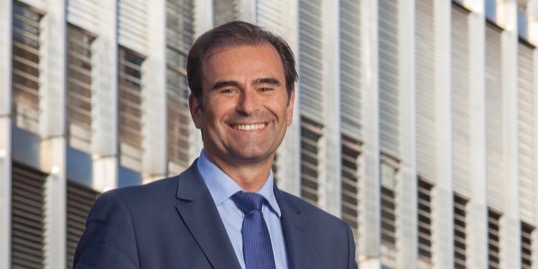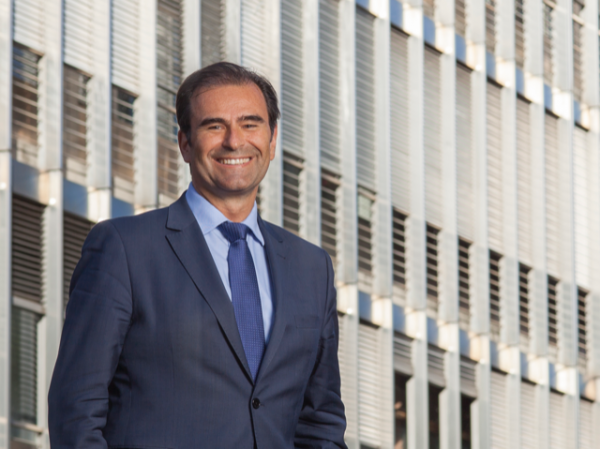The surprising paths of astronomy

Many young researchers are concerned about their professional future. In the InsiderS newsletter, we introduce physicists who did not take the direct path to a professorship, but nevertheless made a successful career, like Stéphane Berthet, Vice-Rector of the University of Geneva.

Stéphane Berthet, Vice-Rector of the University of Geneva. (Photo UNIGE)
Stéphane Berthet was born in Geneva in 1960 and studied in the same city. Marked by the first man on the Moon he followed live at 3am like the 500 million Earthlings of the time, he was quickly fascinated by space and everything that flies. Becoming an astronaut was part of his dreams at that age. For his 14th birthday, his father offered him a small 10 cm telescope, “as soon as I could, I went to observe the sky and drew what I saw”, says the budding astronomer at the time, a hobby that will not let him go during high school, “with a friend, we enrolled in a handicraft course and asked the teacher to build our own telescope instead of doing what was planned in the program,” smiles the vice-rector of the UNIGE, “that’s how we built a 20 cm telescope.”
If he is passionate about the stars, it is the planes that seduce him, “I liked astronomy, but planes attracted me even more than the stars and I wanted to become an airline pilot. I also went to talk to Swissair training managers,” Stéphane Berthet recalls. But an event will decide otherwise. Before reaching their Maturité, the Collège de Genève offers its high school students a day of professional orientation in various institutions, including the University. “I went to see what was being done at the Faculty of Science of the University,” explains Stéphane Berthet, “and then, following the enthusiastic presentation of Mr. Mermod, Professor of Physics, I understood that this was the path I wanted to follow, physics, which would later lead me to astronomy.”
So, he graduated in physics, then in astronomy, and then in 1991 he defended his thesis.
However, at the beginning of 1990, the UNIGE Astronomy Observatory posted an announcement that Switzerland was embarking on the recruitment of astronauts, which it wished to propose to ESA as part of the process of setting up a new European Astronaut Corps. The childhood dream then resurfaces.
This announcement will guide Stéphane Berthet’s life. “A few years earlier, I had attended a conference given by Claude Nicollier, and I thought that astronaut was a wonderful job, and then suddenly there was perhaps the possibility of becoming one,” he recalls, especially since ESA’s requirements were not so extraordinary, “you had to be in good physical shape, speak English, be between 27 and 37 years old and have studied science or medicine”. He therefore embarked on this adventure without really believing in it. But after tests of all kinds and a few months later, he was among the five Swiss (the only one from French-speaking Switzerland) selected by the country to be presented to ESA. Each ESA member country had made similar national selections. “We were therefore about fifty astronaut candidates received at ESA and all qualified to do the job. At that time ESA had just abandoned the European shuttle program Hermes and it no longer needed 10 astronauts but 6!” A new selection phase has therefore begun over several months across Europe to select 6 astronauts. Faced with competition from the French, Germans and Italians, the candidates from Switzerland, a small contributor to ESA who already had an astronaut in the agency (Claude Nicollier), had little political chance. Finally, no Swiss will be selected among the 6 astronauts (F, I, B, D, S, E) who were to form the ESA astronaut corps of the time. “This short journey as an astronaut candidate did not go unnoticed, as I was the only one from French-speaking Switzerland, I was given several articles in local and Swiss newspapers, which made me known against my will,” smiles Stéphane Berthet.
This whole adventure took place in parallel with his research activity, and his thesis in hand, the question that quickly emerged was to know what he was planning for the future, an issue that remains crucial even today for many young people in this situation. “I did have a master assistant position at the University of Lausanne, but it was going to end three years later, with no guarantee of continuation and I didn’t particularly want to become an astronomer wandering between different observatories on the planet,” explains the astronomer. In the discussions on this topic of the future with one of his colleagues from the Observatory in the same situation, he will draw his attention to a possibility: “Did you see in the Tribune that the Confederation is looking for a scientist to deal in particular with the space and astronomy programmes in which Switzerland participates?” After discussions with some professors of the Observatory on the interest of such a position, he proposed his candidacy for this position as Switzerland’s representative in ESA, ESO and other international research organizations, and it’s being held back. He then travelled all over Europe to bring Switzerland’s voice to various scientific fields such as nuclear fusion with JET and ITER, space research and technology with ESA and ground-based astronomy with ESO.
“I had two lives,” says Stéphane Berthet, “a professional in Bern where I became the deputy director of the Office for Outer Space Affairs and who made me travel regularly to Europe, and one in Geneva where I had my family. One day I had to choose, either I stayed in Bern and saw little of my family, or I went back to Geneva and left my job in Bern.” After 11 years in Bern, he decided to return to Geneva. “Once again the chance was with me, a friend of mine pointed out to me that there was a post of Secretary General to be filled at the University of Geneva,” recalls Stéphane Berthet, the idea of getting involved in the institution, which had allowed him to make his experience, seduced him, he applied and was taken. In 2003, he became Secretary General of the University of Geneva. As a member of the management team, he participates in the management of the University and is specifically entrusted with the promotion of the University of Geneva internationally and the promotion of Quality. However, he remains concerned with space since in 2004 he became a member of the Federal Commission for Space Affairs and then vice-president in 2012. In November 2018, Stéphane Berthet was appointed Vice-Rector of the University of Geneva in charge of international and inter-institutional relations, “a new position that allows me to draw on all the experience acquired in recent years as Secretary General on the one hand and as Switzerland’s representative in various international scientific bodies on the other hand.” (PB)
InsiderS No 16: Andreas Hirstein, science editor, NZZ am Sonntag
InsiderS No.15: Bettina Zahnd, head of accident research, AXA

